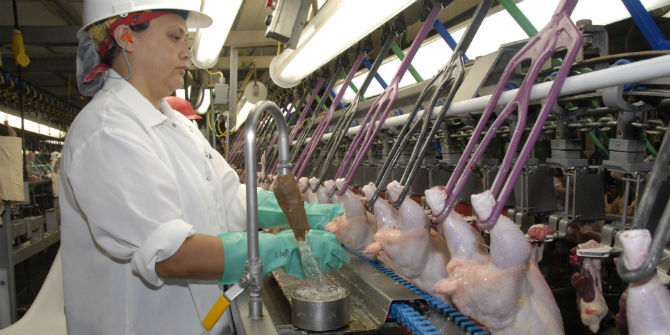This week brings evidence of Russian interference in the UK’s democratic process, very little progress in the Brexit talks, and a big victory for the European Commission in pushing through the EU’s new 7-year budget that proves the EU’s resilience, write Ros Taylor and Roch Dunin-Wąsowicz (LSE).

The Commons’ Intelligence and Security Committee released its previously withheld report into Russian interference in the UK’s democratic process. It does not paint the government in a flattering light: the bottom line is that the “government have actively avoided looking for evidence that Russia interfered,” said Stewart Hosie MP during the Russia report release. LSE Brexit published Ewan McGaughey’s opinion that “the extent of Russian-backed fraud means the referendum is invalid” back in 2018.
Plus ça change. ‘Aimer, ce n’est pas se regarder l’un l’autre, c’est regarder ensemble dans la même direction,’ said Antoine de Saint–Exupéry. When Michel Barnier paraphrased this dictum at the end of the sixth round of EU-UK talks, he replaced ‘aimer‘ with ‘négocier’ – but the general impression is that very little progress has been made, particularly on state aid and fish:
Barnier starts by noting that @BorisJohnson asked for intensified talks to deliver a 'quick' agreement….and 3 UK red lines
– no ECJ
– no constraint on UK law making
– fisheries deal that makes a 'read difference'So…/2
— Peter Foster (@pmdfoster) July 23, 2020
However, the CER’s Charles Grant is slightly optimistic:
The EU is getting fed up with the Brexit negotiations, saying the UK has wasted all the talks in July by not offering any real compromises. They wonder if UK wants a deal. But I still think deal more likely than not (this year). A thread on why I'm slightly optimistic. @CER_EU /1
— Charles Grant (@CER_Grant) July 22, 2020
Beyond Brexit, the EU has finally agreed on the breakdown between grants and loans within the 750bn euro corona-response package. It seems that the union is not only muddling through another crisis, but that bets that the EU would unravel without the UK had been far-fetched. In that vein, Politico reports that “61 per cent of respondents to a poll conducted for the anti-Brexit Best for Britain group said they want to remain a member of the EU’s landmark Erasmus programme, including a narrow majority of Conservatives and 47 per cent of Leave voters”. Still, there are fears that the UK could be cut off from EU’s research programmes. The Times Higher Education reports that the “changes to EU plans could deter UK government by making it net contributor to Horizon Europe“.
On the blog
Brexit is a radical policy innovation that increases uncertainty. Richard Bronk argues that the UK government should therefore improve its ability to navigate uncertain futures and avoid the perils of groupthink by remaining open to diverse sources of expertise. He also considers how the populist blame game may play out, as the imagined post-Brexit future collides with reality at the end of 2020.
Britain faces a fateful decision. If it wants an FTA with the EU, says Carl Baudenbacher, it will need to either sign up to EFTA/EEA institutions, or accept the Ukraine model – which will mean it is still under the jurisdiction of the ECJ.
Nurses from the EU have stopped coming to work in the UK because they no longer feel welcome in the country, writes John Wells. Brexit will bring to an end to the tradition of Irish nurses working in Britain. It also looks unlikely that EU nursing qualifications will be recognised from January, and research will lose out if the UK excludes itself from EU funding.
Finally…
Russian socialite Lubov Chernukhin was named as the Conservatives’ biggest female donor. She has given £1.7m to the party, among other things to play tennis with Boris Johnson and to dine with Theresa May. Tatler (sic!) writes that many high-profile Russian expats might be taken aback by all this focus on their home country, which they left for Londongrad.
And the European Commission has been social distancing in creative ways…
The kids are having fun at the European Council. #euco #thuglife #newnormal #creative #handshakes pic.twitter.com/CErQtiTTQ8
— 𝙺𝚘𝚜𝚝𝚊𝚜 𝙺𝚊𝚕𝚕𝚎𝚛𝚐𝚒𝚜 (@KallergisK) July 17, 2020






